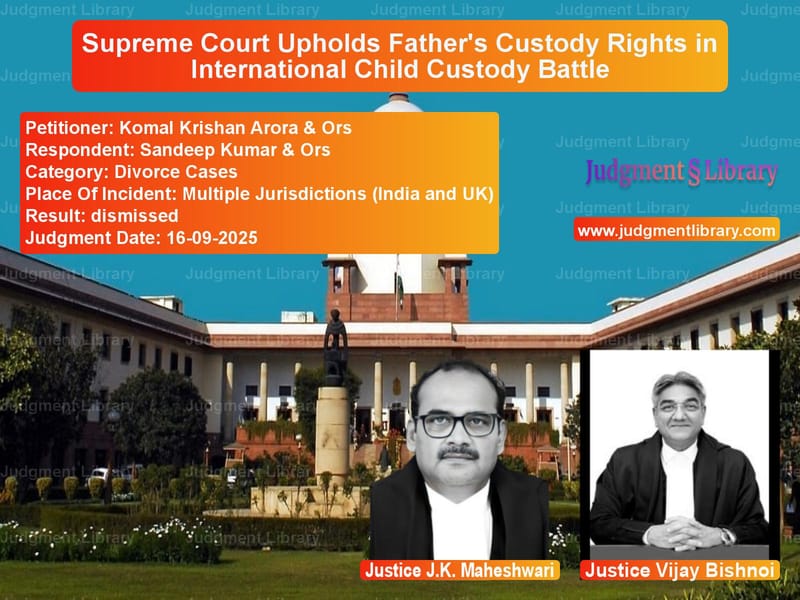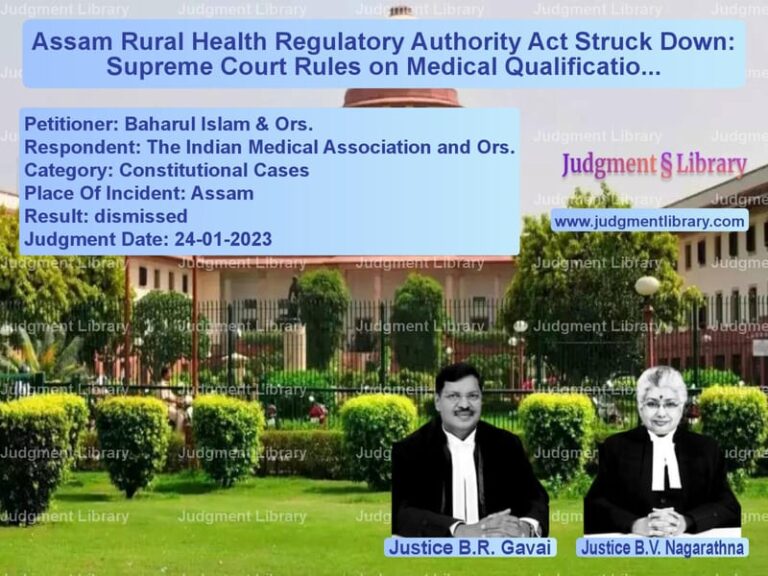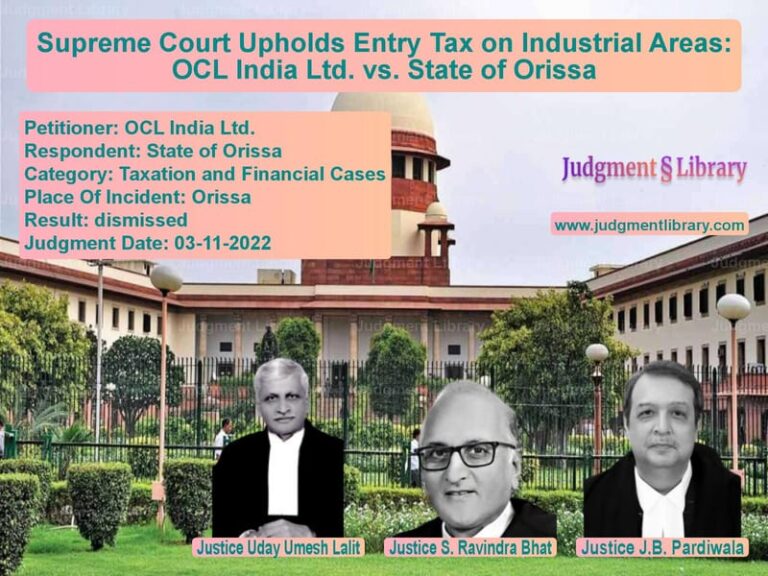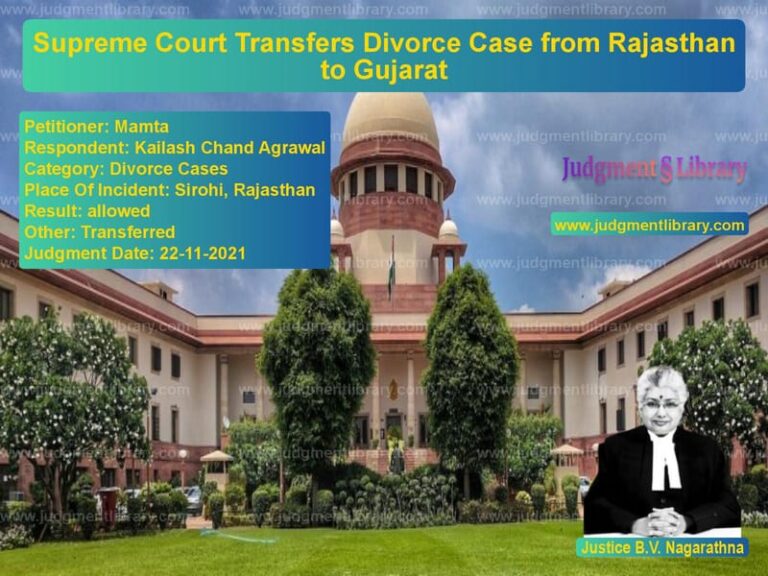Supreme Court Upholds Father’s Custody Rights in International Child Custody Battle
In a landmark judgment that underscores the paramount importance of child welfare in custody disputes, the Supreme Court of India recently delivered a comprehensive verdict in a complex international child custody case involving cross-border litigation between India and the United Kingdom. The case presented a challenging scenario where parents were engaged in simultaneous legal battles across two countries, with their children caught in the middle of this jurisdictional tug-of-war.
The legal dispute involved Sandeep Kumar (father) and Latika Arora (mother) who married in 2010 and had two children – a daughter ‘Miss N’ and a son ‘Master K’. The family’s international background added layers of complexity to the case, as both parents had lived and worked in the UK from 2010 to 2018 with indefinite stay permission. The marital discord began when the mother left the matrimonial home in March 2020 with both children without informing the father, who was abroad at that time.
The International Legal Battle Unfolds
The situation escalated when “the mother left India for United Kingdom on 08.05.2021 with both the children without informing him and his consent.” The father, being clueless about his children’s whereabouts, attempted to locate them through child helpline and eventually filed a formal police complaint on June 3, 2021.
Meanwhile, parallel legal proceedings began in both countries. The mother filed an application for non-molestation and occupation order against the father in the UK on June 7, 2021, while the father filed a divorce petition in Noida on July 5, 2021. Simultaneously, he approached the UK High Court of Justice, Family Division, seeking return of the children to India, arguing that “the mother wrongly removed the children from India without his knowledge and consent.”
The Deception Unraveled
A crucial turning point in the case emerged when the UK High Court discovered that the mother had misrepresented facts. While she had taken her daughter to the UK, she had left her son Master K with her parents in Sonipat, India, without informing either the father or the UK court. The UK High Court strongly condemned this conduct, noting that “It is clear from the above that the mother lured the court into error by failing to disclose that she had only removed Miss N to the UK and that Master K remained in India. This crude subterfuge, which was always going to be found out, does the mother no credit at all.”
The father’s suspicions grew when during court-ordered video calls, “Master K was either asleep or unavailable most of the times for flimsy reasons stated by the mother. All the calls of Master K were always muted and his video background was also always hidden.” This led the father to file a habeas corpus petition before the Punjab and Haryana High Court on September 10, 2021.
The Supreme Court’s Child-Centric Approach
The Supreme Court bench comprising Justices J.K. Maheshwari and Vijay Bishnoi emphasized that in custody matters, “the welfare of the child prevails over the legal rights of the parties while deciding the custody of minor child.” The Court reiterated established legal principles that “the children are not mere chattels : nor are they mere playthings for their parents. Absolute right of parents over the destinies and the lives of their children has, in the modern changed social conditions, yielded to the considerations of their welfare as human beings.”
The Court elaborated on what constitutes child welfare, stating that “The factors defining the best interests of a child are multiple and range from quality education, a nurturing family environment, healthy worldly experiences, provision of basic amenities of life, meeting of financial requirements, access to a friendly social system to imparting of spiritual and cultural learnings.”
Assessment of Parental Conduct
The Court expressed strong disapproval of the mother’s conduct, observing that “We are constrained to express our displeasure at such conduct of the mother and deprecate the same.” The Court noted that “Master K throughout was living with appellant no. 1 and father was deliberately not informed about the same despite the Court orders. As such, it appears that mother never intended Master K to meet his father and to say the least, honour the Court orders. The judicial system in India as well as UK had been taken for a ride by the mother.”
The Court also took note of the father’s qualifications and ability to provide for the child, noting that “father is a qualified engineer having Master’s degree in Computer Science with a post-graduate diploma in Business Administration.” The Court found that “his earning is sufficient, and he is owner of residential flat in Sector-70, Noida and currently residing there with his mother and younger sister.”
Final Ruling and Comprehensive Directions
After thorough consideration, the Supreme Court upheld the High Court’s decision to grant interim custody to the father, stating that “in our considered opinion, Noida is more suitably located than Sonipat, having better educational institutes, therefore, in our view, welfare of the Master K, would be served if the interim custody of the child is given to the father who is also the natural guardian.”
The Court issued detailed directions to ensure the child’s welfare:
“a. The custody of minor K shall be handed over by the appellant no. 1 (mother’s father) to father within a period of fifteen days from the date of uploading of this judgment on or before 30.09.2025.”
“b. After handing over the custody of Master K, father/mother, as the case may be, shall file appropriate proceedings under the provisions of the Guardians and Wards Act, 1890, before the competent Court within a period of one month.”
“c. Mother/sibling of Master K shall have the right to audio/video access to him on every Saturday from 5 p.m. (IST) to 7 p.m. (IST).”
“e. The father shall not take Master K outside the jurisdiction of India without the leave of the jurisdictional High Court.”
The Court also established a monitoring mechanism, directing that “The Juvenile Justice Board/ Magistrate (Juvenile Justice) of the place where Master K would stay with father in future shall oversee and monitor the physical and psychological well-being of Master K through the Child Welfare Committee or any Social Welfare Officer available within the District.”
This judgment reinforces the fundamental principle that in child custody matters, the welfare of the child remains the paramount consideration, overriding all other legal rights and claims. The Supreme Court’s comprehensive approach, balancing the child’s immediate needs with long-term welfare considerations, while ensuring proper monitoring mechanisms, sets an important precedent for handling complex international child custody disputes. The decision demonstrates the judiciary’s commitment to protecting children’s interests even in the most complicated cross-border family disputes.
Petitioner Name: Komal Krishan Arora & Ors.Respondent Name: Sandeep Kumar & Ors.Judgment By: Justice J.K. Maheshwari, Justice Vijay Bishnoi.Place Of Incident: Multiple Jurisdictions (India and UK).Judgment Date: 16-09-2025.Result: dismissed.
Don’t miss out on the full details! Download the complete judgment in PDF format below and gain valuable insights instantly!
Download Judgment: komal-krishan-arora-vs-sandeep-kumar-&-ors-supreme-court-of-india-judgment-dated-16-09-2025.pdf
Directly Download Judgment: Directly download this Judgment
See all petitions in Child Custody
See all petitions in Alimony and Maintenance
See all petitions in Domestic Violence
See all petitions in Property Division in Divorce Cases
See all petitions in Judgment by J.K. Maheshwari
See all petitions in Judgment by Vijay Bishnoi
See all petitions in dismissed
See all petitions in supreme court of India judgments September 2025
See all petitions in 2025 judgments
See all posts in Divorce Cases Category
See all allowed petitions in Divorce Cases Category
See all Dismissed petitions in Divorce Cases Category
See all partially allowed petitions in Divorce Cases Category







